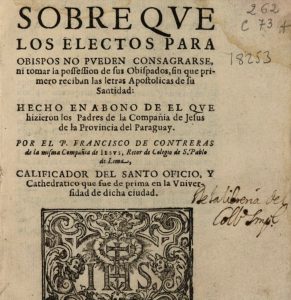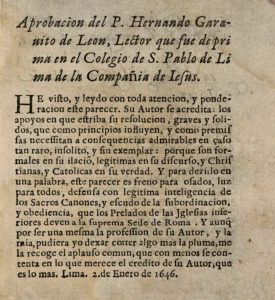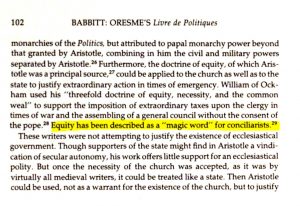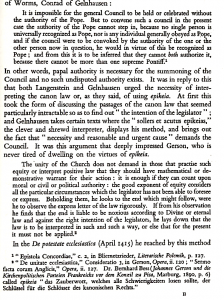+St. Flavian, Bishop and Martyr+
Here is yet another example of how duplicitous Traditionalist pseudo-clergy truly are and how they continue to deceive what should have been the elect. We are talking here today about the quasi-legal rule of equity or epikeia they erroneously cite to justify their lack of papal mandate in consecrating bishops, as well as their operations over the decades in general. What is presented below doesn’t need much further explanation, since the dangers and inapplicability of epikeia as employed by Traditionalists has long been condemned in various articles on this site. Not only do these documents below forbid its “emergency” use, they show that the entire concept of applying epikeia in this way originated from heresies later condemned by the Church, and that the Church has identified it as harmful and destructive of her own teachings. Many thanks to the Spanish reader who located and translated these works! Such contributions are invaluable and are much appreciated.
It may be useful here to further note that the case against these Traditionalists was long ago proven on this site using the laws and teachings of the Church. That so few have risen up against those who continue to profit from operating Traditional mass centers and other enterprises should be no surprise, seeing that only a tiny portion of the elect would be saved in these times. This we know from Christ’s remark that He would scarcely find faith on the earth when He returned. And if we examine Bible history, we see that it is not ordinarily those who believe they will be saved (by Mass and Sacraments they do not possess) but those who refuse to participate in false worship who are careful to obey all God’s laws and the laws of His Church. Thus the majority of the Jews were not saved, owing to idolatry and their rejection of Christ, and the majority of “Catholics” living during the 1960s who docilely accepted the Novus Ordo Missae abandoned Christ as well.
This is not to say that a certain number, Protestant, Novus Ordo and Traditionalist alike, may not be saved owing to invincible ignorance or baptism of desire. That is something only God can determine, as Pope Pius IX explains. But it is to say that those who have even the slightest doubt that what is said here could indeed be true have a strict obligation to investigate and inform their conscience. And there can be no childish whining and carrying on about the isolation involved in praying at home or the sacrifice of the social aspect of their present beliefs and practices! True lovers of Christ do not count the cost, when their Divine Redeemer was rejected by His own race, wounded in the house of those who were supposed to love Him, and died an agonizing death on the Cross to open the gates of Heaven for us. And this is not to mention all the many glorious saints and martyrs who gave their lives rather than violate one article of Faith. Listen to Bishop George Hay on this subject:
“For one to be in invincible ignorance it is required that he be sincerely resolved to embrace the truth wherever he may find it and whatever it may cost him. For if he be not fully resolved to follow the will of God, wherever it shall appear to him, in all things necessary to salvation; if on the contrary, he be so disposed that he would rather neglect his duty and hazard his soul than correct an ill custom, or disoblige his friends, or expose himself to some temporal loss or disadvantage… such a disposition must be highly displeasing to God and an ignorance arising from it can never excuse him before his Creator… He must sincerely use his best endeavors to know his duty, and particularly that he recommend that matter earnestly to Almighty God, and pray for light and direction” (The Sincere Christian, 1787).
This is only what we have said all along. No amount of pleading or reasoning will win these folks over, but grace alone, something not within our power to grant. This does not, however, relieve us of the obligation to present all evidence we find that applies to our circumstances today. Now to the subject matter at hand.
A theologian condemns the use of Epikeia in papal mandate cases


Información sobre que los electos para obispos no pueden consagrarse ni tomar la possession de sus obispados sin que primero reciban las letras apostolicas de su Santidad
(Printed with the approval of many ecclesiastics of the times, listed in the introduction pages.)
35[…]Then the Bishop elected by His Majesty, finding his Church in need of a Bishop’s government, must regard the law of the Pope as harmful, which commands, under severe penalties, that bishops neither consecrate themselves nor take possession of their Bishoprics without Apostolic Letters presented, but who does not see that this proposition condemns the use and observance of all the Bishops of the Kingdom, who, presented by His Majesty, always await the Apostolic bulls, an end never to doubt, nor pass them by the thought, that the bulls and canons of His Holiness ceased to be contrary, and it was a harmful thing to keep them, since it has been seen in this Kingdom that the Bishops-elect wait for a longer time than the one that your lordship waited for, and even have died before consecrating him.
In addition, the King our Lord, as Patron of the Churches, asks and orders the bishop-elect, who wants to take charge of the government of the Church, so that he presents it, in the meantime that the Apostolic bulls are dispatched, for which he dispatches a cedula to the Chapter of the said Church, by way of request, and order, that they give the said bishop the government of the Church. Then your Majesty, and your most wise Council never recognize another way to enter possession of the Bishopric and consecrate yourself, as your Lordship says, which is expressly against the Patron of the churches of Peru, that by the mere presentation of yours, without Apostolic letters first seen and presented in his Council, cease the contrary Pontifical laws and the use of said Apostolic letters first, in said Council, and that if harmful, and pernicious, the provisions of the Supreme Pontiff, and by the Patron of the churches.
36. The second proposition that emerges as an evident consequence of the doctrine, which the Lord Bishop encourages in his favor, is that it would be harmful in some case the recognition that is due to the First Head, waiting after the presentation of his majesty, the fiat and confirmation of His Holiness.
If this proposition were true, as your honor thinks, from which it would follow there would be in the Church of God some Bishop, with full episcopal jurisdiction, who for reasons of little foundation, AND EPIKEIA (who say such recognition is harmful) exercised pontifical office in the particular Churches, an end that emanates from the first universal head, to whom it is incumbent to give particular Prelates, to the particular Dioceses.’
I am not going to lengthen in saying how bad this proposition sounds, nor in qualifying it. I only propose it simply, so that the learned, if they see some exaggerations of the Bishop and qualifications that he gives to the authors of the appearance that opposes him, understand, that those who gave their opinion, as sons of the Roman Church, and so forced to look for their Supreme Dignity, said the doctrine that supports it, without conferring the opposite. As the propositions are more than inferences or deductions, see the learned Vázquez … where with the vividness that usually treats a case, which by epikeia some Doctors, and well classics, wanted to exempt from a law established by the Pontiff, you put this argument in simili form, and it is called moral demonstration, as it truly is. [In other words, the proposition used by those promoting epikeia is not properly grounded in the proper scholastic form — Ed.]
37. Let us suppose that an elected Bishop, presented by His Majesty, having received the certificates of presentation, went to the Church, so that he would be presented as distant, as all those of Peru are, and in great need of a Bishop to govern it, owner, and that said Bishop who is distant, and with the need to consecrate it, and take possession of his Bishopric and that His Holiness in the interim, having made the consistories that are made for the confirmation of the Bishop, finds that he does not had to confirm, [have what is necessary for confirmation] and not confirm him; I wonder what it would be then? Would epikeia prevail? or the express will of the Pontiff? Because if epikeia prevailed, we should say that there may be episcopal jurisdiction in the Church of God, which does not emanate from the Supreme Head, against his express will. If the express will of His Holiness prevailed (as is certain to prevail), it would be evident that the express will of His Holiness had been kept, by fiat, and his confirmation, and that the reason of epikeia could not be used in said case.
38. Confirm the second, because if this reason of epikeia were established, in matters of Bishoprics, and episcopal jurisdiction, and in how due it is to insult the certain, and sure, and not doubtful, and debatable jurisdiction, that it could be used of epikeia, by necessity of the Churches, and distance from the Roman Curia; It could also be used, in that the presentation of His Majesty would not be necessary, and that without it a Bishop neighboring the Bishopric in need could consecrate for said Church, a simple priest, with the full power of Bishop, since whoever can in the most, as he does not keep confirmation of His Holiness, which is essential for the Bishops, they may at least, as is the presentation of His Majesty. And so if he can cease contrary to the Pontifical law, that an bishop is not, nor is the fiat of the Pope consecrated without him, and without Pontifical letters, which testify to it, the law of Pratonazgo may also cease contrary, that Bishop is not admitted, but it is with the presentation of his Majesty, with which it would reduce serious matter, and of the Supreme ones, which can be offered in the Church, to only epikeia.
https://books.google.es/books?id=KrG6ZwCy7HEC&printsec=frontcover&hl=es#v=onepage&q=37&f=false
The heretical origins of epikeia
And this from Oresme’s Livre de Politiques and the France of Charles V


The above reads:
“Monarchies of the politics but attributed to papal monarchy power beyond that granted by Aristotle, combining in him the civil and military power separated by Aristotle. Furthermore the doctrine of equity of which Aristotle was a principal source could be applied to the Church as well as to the state to justify extraordinary action in times of emergency. William of Ockham used his threefold doctrine of equity and necessity and the commonweal to support the imposition of extraordinary taxes upon the clergy in times of war and the assembling of a general counsel without the consent with the Pope. Equity has been described as a magic word for conciliarists.
“These writers were not attempting to justify the existence of ecclesiastical government. Those supporters of this state might find in Aristotle a vindication of secular autonomy; his work offers little support for an ecclesiastical polity. But once the necessity of the church was accepted as it was by virtually all medieval writers, it could be treated like a state. Then Aristotle could be used not as a warrant for the existence of the church but to justify…
“Conrad of Gelnhausen said it is impossible for the general council to be held or celebrated without the authority of the Pope. But to convene such a council in the present case the authority of the Pope cannot step in because no single person is universally recognized as Pope nor is any individual generally obeyed as Pope. And if the council were to be convoked by the authority of the one or the other person now in question, he would in virtue of this be recognized as Pope and from this it is to be inferred that they cannot both authorize it because there cannot be more than one Supreme Pontiff.
“In other words, papal authority is necessary for the submitting of the council and such undisputed authority exists. It was in reply to this that both Langenstein and Gelnhausen urged the necessity of interpreting the Canon law, or as they said, of using epikeia. At first this took the form of discussing the passages of the Canon Law that seemed particularly intractable, so as to find out the intention of the legislator, and Gelnhausen takes certain texts or the “sollers et acutus epikeias” — the clever and shrewd interpreter displays his method and brings out the fact that necessity and reasonable and urgent cause demands the council. It was this argument that deeply impressed Gerson who has never tired of dwelling on the virtues of epikeia.
“(Gerson wrote): “The unity of the church does not demand in those that practice such equity or interpret positive law that they should have mathematical or demonstrated warrant for their action: It is enough if they can count upon moral or civil or political authority: the good exponent of equity considers all that particular circumstances which the legislator has not been able to foresee or express. Beholding them he looks to the end which might follow were he to observe the express letter of the law rigorously. If from his observation he finds at the end his liable to be noxious according to divine or eternal law and against the right intention of the legislators, he lays down that the law is to be interpreted in such and such a way or that for the present it must not be applied.”
(Conrad of Gelnhuasen and Henry of Langenstein were noted German theologians who followed Urban VI. Jean Gerson was a French theologian and later a follower of Benedict XIII. He was a good friend of the French Bishop Pierre d’Ailly.)
According to the Catholic Encyclopedia (1911): “Ockham’s attitude towards the established order in the Church and towards the recognized system of philosophy in the academic world of his day was one of protest. He has, indeed, been called ‘the first Protestant.’” The encyclopedia article goes on to relate that Ockham aligned himself with John of Jandun and Marsilius of Padua, both condemned heretics (DZ 495-500). Jean Gerson was a noted conciliarist, and the Gallicanist position professed by Gerson, d’Ailly, Ockham and others was later condemned by Popes Innocent XII and Pius VI, also the Vatican Council. This is the very heresy Traditionalists practice today, a heresy that makes bishops equal in power and supremacy to the pope and denies that the pope is at all necessary to constitute the Church. By claiming they perpetuate the Church as Christ constituted it without him, they deny the necessity of the papacy and the pope’s supreme authority, heresies condemned at the Vatican Council.
Historian condemns the use of epikeia during the Western Schism
What follows below has been quoted elsewhere on this site, but only supports what is said above — that epikeia has been used before as a ruse to sidestep papal authority and put bishops alone in charge of the Church. Traditionalists go even further than the Gallicanists, however, who at least conceded a primacy of honor to the pope and did not go so far as to exclude him from the Apostolic College. And Traditionalists cannot claim, as the conciliarists could, that their ordinations and consecrations are certainly valid. To eliminate the pope entirely from the picture as Traditionalists have done would later be the professed goal of the Protestants and the Freemasons, two conspicuously interrelated groups. So Traditionalists actually have far more in common with those two entities than they do with anything even remotely Catholic.
The following is taken from the work of a medieval history lecturer, Walter Ullmannn who wrote in The Origins of the Great Schism, (1948):
“If all the cardinals had been killed during an election, or had all died, no other way would be open to elect a new pope except by a General Council : this, Conrad maintains, is the considered view of such eminent canonists as Joannes Andreae and Hostiensis. Thus, there can be a General Council without papal authorization. The pope’s consent to a General Council is therefore not a formal requirement for its validity : “Non est de formali ratione concilii generalis, ut per papam convocetur.”
“It is quite true, Conrad argues, that positive law requires papal authorization, but one cannot and must not take a narrow and purely legalistic view in these matters by simply relying on the letter of the law. For legislators are concerned mainly with those issues which occur frequently: “Legislatores frequenter attendunt ad ea, quae saepe et ut in pluribus accidunt.” It is impossible, he says, to lay down binding rules which are suitable for every case : ” Non fuit possibile regulariter leges et jura condere positiva, quae in nullo casu deficerent.”
“Referring to the simile of St. Augustine that just as the soul is to be preferred to the body, in the same way the sense should take precedence over the words of the law, Conrad coins a phrase which betrays his legal training, understanding and acumen, namely, that the law is not made for the sake of words, but for the sake of things themselves : “Nee verbis, sed rebus lex est imposita.” The true interpretation of every law must proceed upon the Aristotelian basis of epieikeia, that is, of equity, which is the only adequate criterion for a satisfactory explanation of positive law.
“Equity is that element which is best fitted to discover the mens legislatoris. Although it is still true to say that the pope must authorize a General Council, there are cases which the legislator could not have foreseen; and which therefore are outside the precincts of positive law. One of these cases which says, inter alia, that “synodum congregare non potestis regulariter.” Consequently, the legislator implicitly admitted that there are cases which are outside the general norm. And for these cases the law does not provide. They must be decided on the basis of generally valid principles. In conclusion, there is, according to Conrad of Gelnhausen, no legal obstacle to the convocation of a General Council without papal authorization.
“How strongly Conrad was influenced by Ockham, may be seen from a comparison of the definitions of a general council as given by Conrad… Neither Ockham nor Conrad stated who should convene the general council. Ockham, in a somewhat hazy manner, seems to think that it is the universalis ecclesia, Equity is that element which is best fitted to discover the mens legislatoris. Although it is still true to say that the pope must authorize a General Council, there are cases which the legislator could not have foreseen; and which therefore are outside the precincts of positive law…
“As a glance at the canon law confirms, all these proposals, however ingenious they may have been, were, from the point of view of positive canon law, illegal: it was only through what nowadays would be called a normative-teleological interpretation that theologians and canonists were able to deduce conclusions which seemingly harmonized with the spirit of the law; no other than this extra-legal, meta-juristic method of explaining canonistic enactments would have yielded the desired result.
“We may now briefly outline the dogma which was so openly violated and we may then ask : How can this change of opinion be explained? The dogma was lucidly laid down by St. Thomas in his Summa (2a 2ae q.39, 1). According to him – and we may well add, according to the teaching of the Church – the unity of the Church is achieved, on the one hand, by the close interrelationship of the members of the Church and, on the other hand, through the subordination of all its members under one head. This head is Christ Himself, whose representative is the Roman Pontiff.
“The primacy of the pope essentially consists in an omnipotent jurisdiction as regards everything spiritual. The pope is not a delegate of the Church, but her head divinely ordained. Consequently, everyone, including the cardinals, are subordinated to his power and jurisdiction. He, on the other hand, wields all power, precisely because he is the divinely ordained head and he cannot be subjugated to any body or power. This dogma was fully expressed in the canon law also: the constitution of the Church, as set out in the canon law, does not allow any curtailment of the pope’s all-embracing authority. As long therefore as there is no reason to challenge the power of the pope, this legal and constitutional principle works satisfactorily…
“Perhaps the best criterion that distinguishes Cardinal Zabarella from the publicists, including Marsiglio is that the pseudo-legal, meta-juristic panacea of epieikeia occurs not onece in his tracts. This concept, as we have seen, assumed great importance in the publicistic literature which tried to introduce this compliant term in order to achieve the desired result. Zabarella is far too much of a jurist to operate with amorphous concepts such as epieikeia” (pgs.180-183; p.199).
Conclusion
And so, very long ago, we see that epikeia was entirely ruled out as a way to escape the authority of the pope and accomplish a clever workaround to diminish his office and power. What Ullmann points out in quoting St. Thomas Aquinas, and what everyone in Traddie land refuses to concede, is that the pope was no mere man, but Christ’s Vicar, acting with His voice and in His name. Not only have these pseudo-clerics managed to still that voice, they have succeeded in banishing Christ Himself, the Incarnation, from the very Church He established on earth, just as Henry Cardinal Manning predicted.





